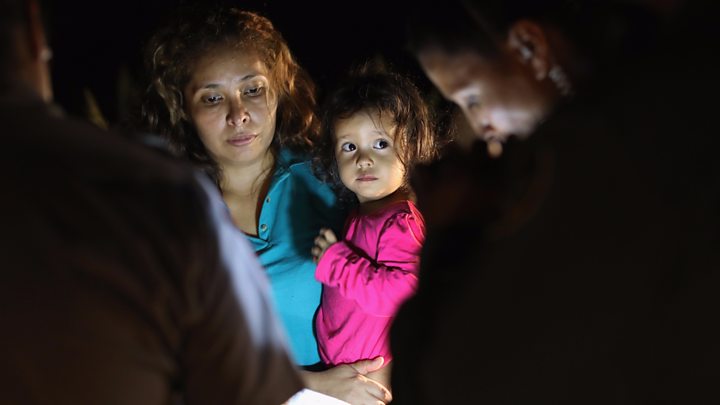Confusion over fate of US child migrants separated from families
The federal government wrestled with the fallout Thursday over Donald Trump’s move to stop separating families at the border, with no clear plan to reunite the more than 2,300 children already taken from their parents.
At the same time, the Justice Department went to court in an attempt to overturn a decades-old settlement that limits to 20 days the amount of time migrant children can be locked up with their families.
Democratic mayors and religious leaders, meanwhile, traveled to the border to step up pressure on the White House over its hardline immigration policies. And in the Texas border city of McAllen, federal prosecutors unexpectedly did not pursue charges against 17 immigrants. A federal prosecutor said “there was no prosecution sought” in light of Trump’s executive order ending the practice of separating families.
It was unclear whether that meant the Trump administration was dropping its months-old “zero tolerance” policy of prosecuting all adults caught trying to enter the country illegally. The president did not answer the question directly but showed no sign of softening.
“We have to be very, very strong on the border. If we don’t do it, you will be inundated with people and you really won’t have a country,” Trump said.
The confusion and uncertainty resulted from the abrupt ending Wednesday of a White House policy that separated more than 2,300 children from their parents over the past several weeks. The practice set off an outcry from all corners of the world, with the images and sounds of crying children dominating the news.
After Trump’s executive order, a host of unanswered questions remained, including what will happen to the children already separated from their parents and where the government will house all the newly detained migrants, with the system already bursting at the seams.
Officials from the Defense Department and Health and Human Services said the Pentagon has agreed to provide space on military bases to hold up to 20,000 people detained after illegally crossing the Mexican border.
It was unclear which bases would be used. But HHS has assessed four as prospective housing for children: Fort Bliss, Goodfellow Air Force Base and Dyess Air Force Base in Texas, and Little Rock Air Force Base in Arkansas.
The Justice Department asked a federal judge to change the rules regarding the detention of immigrant children, seeking permission to detain them for longer than the permitted 20 days in an effort to keep them together with their parents.
Meanwhile, the mayors of about 20 U.S. cities gathered at a holding facility for immigrant children in the border city of El Paso. They accused Trump of failing to address a crisis of his own making.
They called for the immediate reunification of immigrant children with their families.
“This is a humanitarian crisis,” Seattle Mayor Jenny Durkan said.
In Washington, the House killed a hard-right immigration bill Thursday and Republican leaders delayed a planned vote on a compromise GOP package, with party members fiercely divided on the issue. Democrats oppose both measures.
The rejected bill would have curbed legal immigration and bolstered border security but would not have granted a pathway to citizenship to “Dreamers” who arrived in the country illegally as children.
The delayed vote was on a compromise bill between GOP moderates and conservatives that would offer Dreamers a pathway to citizenship and provide $25 billion for Trump’s border wall, among other things.
Elsewhere, Democratic Gov. Ralph Northam of Virginia ordered an investigation into claims by children at an immigration detention facility that they were beaten while handcuffed and locked up for long periods in solitary confinement, left nude and shivering in concrete cells.
First lady Melania Trump made a surprise visit to a McAllen detention center that is housing some of the children. She told the children to “be kind and nice to each other.”
She made waves while boarding the flight to McAllen in a green military-style jacket with the message “I really don’t care, do u?” on the back.
Asked about it, her spokeswoman Stephanie Grisham said: “It’s a jacket. There was no hidden message.”
Mrs. Trump was wearing a different jacket when the plane landed.
(AP)





